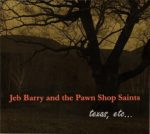 Allison Russell and JT Nero are, collectively, Birds of Chicago. The press release refers to Americana and roots but, even by current standards, that’s stretching the definition. Is that a criticism of this album or Birds of Chicago? Hell, no; the truly great creatives never stand still. Birds of Chicago has evolved into a blend of deep soul, funk, roots and gorgeous melodic pop that defies classification and picks up influences from a dizzying variety of musical styles, blending it into a blissful musical confection. You are getting the message aren’t you? I love this album.
Allison Russell and JT Nero are, collectively, Birds of Chicago. The press release refers to Americana and roots but, even by current standards, that’s stretching the definition. Is that a criticism of this album or Birds of Chicago? Hell, no; the truly great creatives never stand still. Birds of Chicago has evolved into a blend of deep soul, funk, roots and gorgeous melodic pop that defies classification and picks up influences from a dizzying variety of musical styles, blending it into a blissful musical confection. You are getting the message aren’t you? I love this album.
Not one single song that I want to skip and at least two that I want to listen to again and again. I think I’ll concentrate on those two. The title track is a slow, soulful ballad with a moody organ intro and superb use of the impassioned male and female vocals. The “Love in Wartime” title is a metaphor; the theme is the miracle of existence and perseverance, whatever the circumstances. It’s nearly six minutes long, but you just don’t want it to stop; every part of it is so perfect.
“Try” is just over five minutes long and the combination of perfect soulful vocal duet with a steadily building arrangement and a lyric that tackles the difficult subject of loss of motivation and vitality with age and the need to avoid complacency in our relationships and life in general. It’s powerful stuff, musically and lyrically. There is a lot more to the album than the two huge ballads; “Baton Rouge” has a lovely female lead vocal, some French lyrics (of course) and a clarinet solo appearing out of nowhere.
You want me to pick out a few more? Ok, with such a huge mix of influences, it’s pretty much inevitable that you’ll pick out a phrase now and then that evokes something else. “Never Go Back” has a feel of the Stevie Wonder classic “For Once in My Life”, while “Lodestar” evokes The Clash’s “Lost in the Supermarket”. I like to think of it as creative recycling. Don’t even try to impose categories on this album; its heady mix of vocal and instrumental styles is unique.
“Love in Wartime” is released on Friday May 4 on Signature Sounds Recordings.
 Twenty songs over a double CD (well, nineteen actually, one’s a bonus download); you’re never quite sure what message that sends. The official line is that some songs work with band arrangements, some are best as solo/duo arrangements and that’s the way they’ve been split. Personally, my response to studio double albums is one of wariness; could it have been better as a single? We’ll see.
Twenty songs over a double CD (well, nineteen actually, one’s a bonus download); you’re never quite sure what message that sends. The official line is that some songs work with band arrangements, some are best as solo/duo arrangements and that’s the way they’ve been split. Personally, my response to studio double albums is one of wariness; could it have been better as a single? We’ll see.
The common theme across the two albums is obvious. It’s not just Texas, but the southern states and the mentality of small-town America. The melodies are good, Jeb Barry’s voice is striking, cracking with emotion at times, but the real power is in the lyrics. He knows how to tell a story and how create a memorable phrase, a lyrical hook that’s as potent as the melodic ones. In “El Paso Sucks”, there’s a reference to the woman being ‘sideways on champagne’ while “Southern Oak” (taking the opposite tack from the marvellous “Speedtrap Town”) makes the observation that ‘hell and high water make good roots’. And let’s not forget the observation from “Miss Mississippi” that ‘drunk and stupid’s no excuse’.
The playing on the album is all in the service of the songs. You won’t find any lengthy solos or massive riffs, everything’s there to get the message of the song over, whether it’s lovely harmonies or the good old sus4 to create a Byrds/Tom Petty feel on “If This Heart Had Walls”. There’s nothing to take a strong dislike to and there are plenty of strong songs. The download-only song “Speedtrap Town” is a real standout, warning of the literal and metaphorical dangers of straying away from the highway.
And that thing about double albums? Well, I’m still not convinced. I would love to hear a single album edit of this set of songs, but I wouldn’t want to fall out about it.
“texas, etc.” is released on April 27th on Dollyrocker Records (DR-2018-01).
 It’s difficult enough working out where to start a Phil Burdett review at the best of times without having to contend with an album that doesn’t actually start or finish anywhere. The clue’s in the song title “Sisyphus on Denmark Street”; the songwriter condemned forever to push a stone uphill. It could be worse; look what they did to Prometheus. The album cycles continuously from the birth of the dawn in “Net of Joy” to the dusk and senescence of “Dotage Train” and back to the beginning again, linked by the phrase ‘heavy miles to go’ in each song. Reincarnation without any upward or downward mobility and inspiration from the unholy poetic trilogy of William Blake, John Clare and Arthur Rimbaud.
It’s difficult enough working out where to start a Phil Burdett review at the best of times without having to contend with an album that doesn’t actually start or finish anywhere. The clue’s in the song title “Sisyphus on Denmark Street”; the songwriter condemned forever to push a stone uphill. It could be worse; look what they did to Prometheus. The album cycles continuously from the birth of the dawn in “Net of Joy” to the dusk and senescence of “Dotage Train” and back to the beginning again, linked by the phrase ‘heavy miles to go’ in each song. Reincarnation without any upward or downward mobility and inspiration from the unholy poetic trilogy of William Blake, John Clare and Arthur Rimbaud.
If you’re part of the generation that doesn’t listen to albums, this isn’t for you; “Psychopastoral” is designed to be heard in a certain order, start to finish and then again and maybe once more, just to be sure that it is actually a work of genius. Phil’s taken a simple approach to ensuring we listen to everything in the intended order; the entire album’s one track with songs connected by musical and lyrical fragments. Does it work? Bloody right it does; at just under an hour, the images, fragments and melodies rush past at breakneck speed then start all over again bringing fresh musical and verbal marvels to discover.
I could spend hours going into minute detail about every aspect of this album, but that’s not going to help anyone, so I’ll try to pick out some of the attention to detail that permeates every aspect of this beautiful piece of work. How about the musicians? The core of this ensemble has been with Phil for a few years now and each one brings their own individual talents to a great ensemble sound. John Bennett (guitar) is one of my local heroes; comparisons with Steve Cropper are more than justified – not showy, but everything fits perfectly. Steve Stott adds colour and texture with bright mandolin and melancholy fiddle and Colleen McCarthy’s backing and lead vocals are a pure and clear foil for Phil’s soulful growl. And of course, Russ Strothard’s melodic bass playing, Lyndon Morgan’s spoken word contributions and the samples and programming contributed by Al Franklinos.
Phil’s voice sounds as good as I’ve ever heard it and the words are as densely packed with meaning and allusion as ever. I’m not going to bore you with my amateur literary criticism, you can delve into the layers of meaning for yourself (there’s a lyric booklet as part of the CD package); you’ll find it packed with autobiographical references both pleasurable and painful alongside the odd skewed musical reference (‘needles of death and the damaged rum’ from “Sisyphus on Denmark Street”).
I’m a huge admirer of Phil’s work, particularly from “Dunfearing and the West Country High” onwards and with “Psychopastoral”, he’s made an unflinching, uncompromising album that flies in the face of convention in its stance on sequencing and playback. There are some memorably catchy songs embedded in the piece, and Phil’s determined that they stay embedded and we hear them as part of the overall creation. It’s an ambitious project, but it’s perfect in every little detail. Favourite album of the year so far? I think so.
“Psychopastoral” is out now you; can order it direct from Phil’s website.


